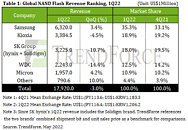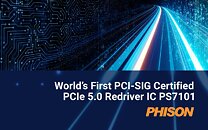
Micron Ships World's First 232-Layer NAND, Extends Technology Leadership
Micron Technology, Inc., today announced that it has begun volume production of the world's first 232-layer NAND, built with industry-leading innovations to drive unprecedented performance for storage solutions. It features the industry's highest areal density and delivers higher capacity and improved energy efficiency over previous generations of Micron NAND, to enable best-in-class support of the most data-intensive use cases from client to cloud.
"Micron's 232-layer NAND is a watershed moment for storage innovation as first proof of the capability to scale 3D NAND to more than 200 layers in production," said Scott DeBoer, executive vice president of technology and products at Micron. "This groundbreaking technology required extensive innovation, including advanced process capabilities to create high aspect ratio structures, novel materials advancements and leading-edge design enhancements that build on our market-leading 176-layer NAND technology."
"Micron's 232-layer NAND is a watershed moment for storage innovation as first proof of the capability to scale 3D NAND to more than 200 layers in production," said Scott DeBoer, executive vice president of technology and products at Micron. "This groundbreaking technology required extensive innovation, including advanced process capabilities to create high aspect ratio structures, novel materials advancements and leading-edge design enhancements that build on our market-leading 176-layer NAND technology."











































